PEN eNews 5(6) April 2016
PEN
® eNews is a monthly e-newsletter shared with the global PEN Community and created to help dietitians position themselves as leaders in evidence-based nutrition practice. In addition, users of the PEN System will find articles on the new evidence, resources and features available and how to maximize one's use of PEN.

Cognitive biases that fuel pseudoscience
Regardless of practice focus, dietitians frequently encounter pseudoscience. With the ease of self-publishing and sharing opinions, there is a sea of information and ideas to sort through. Quality research and science takes time, requiring foundational knowledge, an  understanding of the emerging research in a field, an ability to interpret research design and results, both published and currently on-going. So in the moment you are faced with answering a question, not everything may have immediate answers.
understanding of the emerging research in a field, an ability to interpret research design and results, both published and currently on-going. So in the moment you are faced with answering a question, not everything may have immediate answers.
This leaves the door open for other theories and scientific-sounding arguments to be put forward. This quote from Carl Sagan, American astronomer and renowned science communicator captured me. “Pseudoscience speaks to the powerful emotional needs that science often leaves unfulfilled. It caters to fantasies about personal powers we lack and long for".
A recent article explored why people fall for pseudoscience and how academics can fight back (1). I thought this article had some interesting thoughts for dietitians to consider around unsubstantiated nutrition claims, and why people might believe these claims.
One of the arguments made was around the cognitive biases that people may experience when “falling” for pseudoscience. For example, the sunk cost fallacy explained as the urge to justify previous decisions using the next decision. This may be why people continue to believe in cleanses and detoxes, despite there being limited evidence for their effectiveness.
Another example in the article (1) was the confirmation and selection bias, where we look for evidence to support a theory and ignore contrary evidence. This could explain why people may believe that consuming gluten-containing foods are the cause for their health concerns like fibromyalgia, and that a gluten-free diet is the best approach to improving their health. Or that following a Paleo diet will result in long-term improvement in weight status and body composition.
One bias that particularly caught my attention was what is called the Dunning-Kruger effect – the idea that the less you know, the more likely you are to perceive yourself as an expert (1,2). And, the more you know, the more likely you are to doubt your own confidence. Have you ever fallen to this effect as it relates to nutrition? I admit that I have, and I am sure I am not alone.
With training in critical thinking, research methodology and science, and the practical experience of navigating the less-researched grey areas of dietetics, I can easily see how the more I learn about the science of nutrition, the more I appreciate the complexity of diet, nutrition and research. So how can I convey confidence in communicating information that carries a level of uncertainty?
As dietitians, we have many tools available at our fingertips to support our practice.
- We have knowledge transfer tools, which help accelerate the application of research into our dietetic practice.
- We have professional meetings and webinars where we can network and meet with thought leaders and content experts who help stimulate our thought and offer us new practice perspectives.
- And we have each other – a network of dietitians - with whom we can consult, and observe examples of how to communicate in the grey area of dietetics.
If you believe that you may not have the answer to something, you can rest assured that someone else may be able to help point you in the right direction. There is no doubt we can use the science and research available to us to inform our curiosities and then use our training, experience and background to craft our opinions. That is nothing to doubt.
In this issue of PEN eNews 5(6), we address:
-
Nutritional genomics in the dietetic curriculum – how far have we progressed?
- Why Using GRADE (to Grade the Evidence in PEN®) is Important to Practising Dietitians
- How Do I …. Help My Clients Sort Through Misinformation?
- Celebrating 5 years of PEN eNews with our 10 most popular PEN eNews issues!
- Check out our new PEN® system look and see how we can help power-up your nutrition practice.
- This and more! Enjoy PEN eNews 5(6)!
References:
- Townson S. Why people fall for pseudoscience (and how academics can fight back). January 2016. Available from: http://www.theguardian.com/higher-education-network/2016/jan/26/why-people-fall-for-pseudoscience-and-how-academics-can-fight-back
- Novella S. Lessons from Duning-Kruger. Nov 2014. Available from: http://theness.com/neurologicablog/index.php/lessons-from-dunning-kruger/
Kristyn Hall MSc, RD
Editor, PEN® eNews
PEN® eNews may contain links to other external websites. PENnutrition.com is not responsible for the privacy practices or the content of such external websites. Neither Dietitians of Canada, nor any dietetic associations contributing to or licensing the content in Practice-based Evidence in Nutrition: PEN® endorse the content, products or services on other websites.
What's New in PEN®
Below is a quick glance at some of the new and updated content in the PEN
® knowledge database. Look for the new

and updated

symbols in PEN to see more new and enhanced content!
Updated Knowledge Pathways
Updated Practice Questions
Professional Tools
New Practice Questions
Client Tools
Trending Topics
How Do I …. Help My Clients Sort Through Misinformation?
Written by Jane Bellman MEd, RD
Kerri Staden BSc, RD
Dietitians of Canada
PEN® Resource Managers
As dietitians, we are committed to evidence-based practice where we translate sc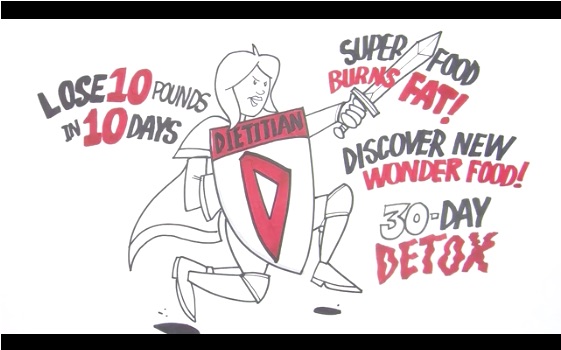 ience into practical information that clients can use to manage their health, and using the PEN® system helps ensure we are basing our advice on the best available information.
ience into practical information that clients can use to manage their health, and using the PEN® system helps ensure we are basing our advice on the best available information.
Here are five tips to help your clients and colleagues sort the evidence-based information from the misinformation.
Is the person, product or article:
- Promising a quick fix like fast weight-loss or a miracle cure?
If it sounds ‘too good to be true’, then it likely is. Making changes means a commitment to eating well and exercising regularly.
- Trying to sell you products such as special foods or supplements instead of teaching you how to make better food choices at home, at play, at work or while eating out?
- Providing information based on personal stories rather than on facts?
It may be nice to hear about a success story from a celebrity, but it's not proof that something works or is true. Nutrition advice should be based on the best available scientific research. Different research designs tell us different information. Interpretation of research requires a basic understanding of research and study design. Review these key research terms:
- Blind experiment—in this type of experiment, the study subjects don’t know which treatment they are getting. This avoids the “placebo effect” where subjects expect the treatment to work so it does.
- Experimental group—the group who gets the treatment being studied.
- Control group—the control group is treated the same way as the experimental group but they do not receive the treatment being tested. This is an important part of a study because it means any effect observed in the experiment group is a result of the treatment.
- Placebo— a placebo mimics the treatment and is used to test the psychological effect of being given the treatment. It could be a diet, a drink or even a sham treatment.
- For more research definitions, click here.
- Making a claim based on a single study or a few research studies?
Were the studies with animals or humans? Are you similar to the humans that were studied (age, sex etc.)? The stronger the study design, and the more studies available that draw the same conclusions, the stronger the evidence that something is true.
- Qualified? You wouldn’t ask a celebrity how to build a bridge, you’d ask a professional engineer. The same thinking should apply for nutrition advice. Dig a little deeper and ask for credentials.
Need more information on research methods? Have a look at our Research Methods Knowledge Pathway, these Cochrane Canada Peer Review Training Modules for Dietitians, or search the PEN® database for research design to find more information.
** This article is adapted, with permission, from a news release from Dietitians of Canada on September 14, 2015.
Written by:
PEN® Resource Managers:
Jane Bellman MEd, RD
Kerri Staden BSc, RD
jane.bellman@dietitians.ca
kerri.staden@dietitians.ca
Nutritional genomics in the dietetic curriculum - how far have we progressed?
Let´s face it, genomics is a hot topic right now, as new studies are covered i n the media on a daily basis, big investments in research are made, as well as the hope of personalized cancer treatments just recently hitting the headlines, become commonplace. As dietitians we simply cannot ignore scientific advancement and how this could possibly influence our roles and profession as a whole.
n the media on a daily basis, big investments in research are made, as well as the hope of personalized cancer treatments just recently hitting the headlines, become commonplace. As dietitians we simply cannot ignore scientific advancement and how this could possibly influence our roles and profession as a whole.
Whilst nutritional genomics is an emerging and rapidly developing science, integration into practice has been less than stellar as evidenced by low knowledge, confidence and involvement by practising dietitians (1). It was estimated almost a decade ago that by now, every person would know their full genome and that individuals would walk into a clinic and leave with their gene results. Whilst this has clearly not transpired, we need to evaluate whether we are prepared now, and if we are preparing students sufficiently for a possible gene-based healthcare system in the future. Coincidentally, I was recently contacted by a dietitian who had a client walk into their clinic with a genetic test, so has the future arrived, and are we ready?
A new qualitative study published in the Canadian Journal of Clinical Nutrition that looked at dietetic students ´attitude and knowledge on nutrigenomics tests (2) caught my attention. After viewing an introductory video on nutrigenomics, focus groups with 23 students were held in Canada. The findings were worrying in that students had minimal knowledge on nutrigenomics, however they had a very strong desire to learn. A recent systematic review that included looking into educational strategies relating to nutritional genomics, also found a need to develop training pathways and material with content experts (3). There is clearly a lot that needs to be done across the board.
As nutritional genomics is incorporated at various levels at universities across the globe, the Canadian study contributes to the literature by highlighting the lack of readiness of future nutrition professionals. For practicing dietitians, trying to stay up to date with this rapidly developing field, can be challenging and therefore a need to review the current knowledge pathways and resources on nutritional genomics has already been identified.
Commonly asked questions, knowledge pathways and patient handouts will be developed by dietitians in the field which are expected to be due out in October this year. We are planning to address topical issues such as:
-
ethics,
-
insurance,
-
nutritional epigenomics and
-
nutritional recommendations to name a few.
Whilst the work is about to commence, there is still time to make your voice heard!
-
Which burning questions do you need answered?
-
Which topics would you like to see?
Whilst we can´t respond to all questions through the guidelines, we want to make sure that when you do get a client walk into your clinic or asks you a question, that you are armed with the facts, the best evidence and the tools to build your knowledge and confidence.
Submit your questions and comments via the PEN system: Submit a Content Idea, or email Beth Armour (PEN® Content Manager).
Submit a Content Idea, or email Beth Armour (PEN® Content Manager).
References
-
Collins J, Bertrand B, Hayes V, Li SX, Thomas J, Truby H, Whelan, K. The application of genetics and nutritional genomics in practice: an international survey of knowledge, involvement and confidence among dietitians in the US, Australia and the UK. Genes Nutr. 2013;8(6):523-33.
-
Horne J, Madill J, O’Connor C. Exploring knowledge and attitudes of personal nutrigenomics testing among dietetic students and its value as a component of dietetic education and practice. Can J Clin Nutr. 2016;4(1):50-62.
-
Wright OR. Systematic review of knowledge, confidence and education in nutritional genomics for students and professionals in nutrition and dietetics. J Hum Nutr Diet. 2014;27(3):298-307.
Written by:
Mariëtte Abrahams MBA RD
Mariëtte is a co-authoring the update of the PEN® Nutrigenomics KP with with Melissa Adamski BSc MND APD AN
Why Using GRADE (to Grade the Evidence in PEN®) is Important to Practising Dietitians
Did you know that PEN is ready to use GRADE to grade its evidence ? This article will help to explain what the PEN GRADE approach means and what future changes you will see in PEN.
What is GRADE?
GRADE is an acronym for: Grading of Recommendations Assessment Development Evaluation. 
GRADE is focused on comparing treatment strategies or interventions, and provides standards for how to:
-
identify practice questions and choose client-important outcomes;
-
use evidence that has been systematically gathered and synthesized;
-
assess and summarize the evidence for each important outcome;
-
consider other factors important to decision-making such as patient values and preferences, resources, acceptability, equity, feasibility etc.; and
-
make a practice recommendation noting the strength of the recommendation and the quality of evidence upon which it is based.
Why Use GRADE in PEN?
Using GRADE will make the practice recommendations in PEN easier to interpret and quicker to read. In addition GRADE will make PEN more:
-
Transparent
GRADE guidelines are transparent in terms of the processes used to find and evaluate the evidence and they focus on outcomes.
-
Consistent (our PEN Editor just LOVES this term!)
Moving to a system that is widely recognized by other health professionals will make it easier for dietitians to communicate benefits or risks of treatment to the wider inter-professional team.
-
Credible
The GRADE approach is guided by leaders in evidence-based medicine with a desire to create a common evidence grading system that is credible, reproducible and understandable by guideline users everywhere. There are over 75 organizations such as WHO, the Cochrane Collaboration and the National Institute of Clinical Excellence (NICE) that have endorsed or are using GRADE.
What Changes Can I Expect to See as a PEN Subscriber?
PEN has always given dietitians an assessment of the quality of the evidence, so many parts of PEN will remain the same, but you will see some changes.
-
The GRADE approach is best suited to questions that compare interventions and that is where we will start in PEN.
-
PEN questions that address issues of diagnosis or prognosis will continue to be addressed using our traditional PEN approach.
-
Starting in 2016 you will begin to see knowledge pathways that contain questions answered using both the traditional PEN approach and the PEN GRADE approach.
The PEN GRADE process is comprised of six steps, much of what is already integral to PEN, but we’ve noted some changes for you:
-
Develop the practice questions (same), but now focused on outcomes of interest.
-
For example, previously we stated our question as follows: Does nutritional status affect the course and severity of chronic obstructive pulmonary disease (COPD)?
-
The revised PEN GRADE question will be more specific and could include: Should malnourished or at risk patients with stable COPD be recommended to receive nutritional support? And/Or Should overweight or obese patients with COPD be recommended to lose weight?
-
Search the literature using a hierarchal approach to identify evidence (done currently and we will now document and disclose the search strategy).
-
Summarize and assess the evidence (same), for each important outcome for an intervention or risk factor. This means that we will describe and examine the evidence for each outcome in a more specific or targeted manner versus describing the evidence for each study independently in an evidence statement.
-
Assess the quality of evidence, now focused on all client-important outcomes across studies and presented in an Evidence Profile Table (table will be a new way to present the information and will replace PEN’s evidence statements in those questions that we answer in the GRADE format).
-
Summarize the evidence, which will now include other important factors contributing to decision-making (e.g. balance of benefits and harms, patient values and preferences, and resource use) presented in an Evidence to Decision Table (a new way of showing how the evidence was used to create a practice recommendation).
-
Formulate the Recommendation and Remarks (whereas before this was a Key Practice Point(s) and Practice Guidance noting the strength of the recommendation (i.e. strong or conditional), and the quality of evidence upon which it is based (changes from Evidence (A, B, C, D) to: ⊕⊕⊕⊕ High,
⊕⊕⊕⊝ Moderate, ⊕⊕⊝⊝ Low, ⊕⊝⊝⊝ Very Low quality evidence).
An example of an excerpt from a recent guideline (1) prepared using the GRADE approach is shown here:
Recommendations for preventing fracture in long-term care.
“For residents at high risk of fractures who cannot meet the recommended dietary allowance for calcium through dietary intake, we recommend daily supplements of calcium up to 500 mg.”
Strong recommendation; ⊕⊕⊕⊝ Moderate-quality evidence
Remarks
“The recommendation for residents at high risk places a high value on the reduction in hip fractures and the small reductions in vertebral and nonvertebral fractures and in mortality that can be achieved with calcium supplementation. It places a lower value on the small increased risk of gastrointestinal adverse effects that may occur and the resources required in long-term care to provide calcium supplementation.”
“These recommendations apply to supplementation with any calcium compound, including calcium carbonate or citrate. The recommendation to limit supplementation to 500 mg was based on the uncertainty about harms of calcium supplementation in studies of community-dwelling individuals who received calcium supplementation of 1000 mg or more daily. The benefits of calcium supplementation are closely linked to adequate vitamin D intake.” (1)
Papaioannou A, Santesso N, Morin S, Feldman S, Adachi J, Crilly R et al. Recommendations for preventing fracture in long-term care. CMAJ. 2015 Sep14; 187(15):1135-44. Abstract available from: http://www.ncbi.nlm.nih.gov/pubmed/26370055
Resources
-
PEN Author and Reviewer Guide and PEN Training Materials page - GRADE Training and Tools:
-
Overview of the GRADE Guideline Development Process
-
A video on the process for developing guidelines using GRADE.
-
GRADE Handbook
-
A handbook for grading the quality of evidence and strength of recommendations using the GRADE approach.
-
Website - GRADE Working Group
http://www.gradeworkinggroup.org/
Sign up for a GRADE session at future education events if you are able:
-
Dietitians Association of Australia (DAA) conference in Melbourne May 19-21, 2016. Session: Evidence-based Practice: Introduction to the GRADE System of Evaluating Evidence, day 2.
-
Dietitians of Canada conference June 8-11, 2016. Session: The New Face of PEN®: “GRADE”ing the Evidence for You, June 9th.
-
International Congress of Dietetics (ICD) in Granada Spain September 7-10, 2016. Session: Building Capacity For Dietitians To Be Leaders In Evidence-Based Practice, date TBA.
Stay tuned for future articles on the process for developing PEN GRADE recommendations, a peer-reviewed PEN GRADE example and a series of short videos/modules to help dietitians understand and use GRADE.
Written by,
Jayne Thirsk RD, PhD, FDC
Director of PEN® System
And
Jane Bellman MEd, RD
PEN® Resource Manager
On behalf of the PEN GRITs (your PEN Grade Implementation Team)
Celebrating 5 years of PEN eNews with our 10 most popular PEN eNews issues!
PEN® eNews was created to help dietitians position themselves as leaders in evidence-based nutrition practice. This issue of PEN eNews 5(6) marks a solid five years of our e-newsletter!
 We took a trip down memory lane to look at some of our most talked about articles from our 10 most popular PEN® eNews issues. Which issues did our readers devour? Read on:
We took a trip down memory lane to look at some of our most talked about articles from our 10 most popular PEN® eNews issues. Which issues did our readers devour? Read on:
1) Most significant changes in nutrition knowledge and dietetic practice over the last 10 years?
Our most popular issue was from our September 2015 supplementary PEN eNews issue, where we celebrated 10 years of supporting dietetic practice. We asked dietitians to share their reflections – their opinions – about what they saw as the most significant change in nutrition knowledge and dietetic practice over the last 10 years. We received 30 submissions, showcasing the breadth of dietetic practice. This is what we heard.
2) What keeps dietitians up at night? 10 Reasons why you can’t sleep –
Information overload, evolving science, time, access to unbiased practice guidance…This article summarizes the many challenges dietitians face each day.
3) Media in Australia: how DAA media spokespeople use evidence to boost their messages
From media contact, to evidence search, to key message development to interview – this article highlights how the Dietitians Association of Australia (DAA) media spokespeople respond to media inquiries and showcase dietitians as credible, evidence-based nutrition professionalsdietitians as credible, evidence-based nutrition professionals
4) Pseudoscience – are the tides changing?
The power of story-telling appeals to our emotional brain and can result in unsubstantiated nutrition and diet claims. But there is a new trend gaining traction – savvy media consumption and “evidence literacy”.
5) Taking pseudoscience to task!
We highlight professionals and organizations who have called those making “suspicious or fraudulent claims to task.
6) PEN® Team’s Surprising Findings
Gut microbiome, taste perceptions from an airplane, dietary patterns vs specific nutrients, plant-based beverages for infants…Each day, the PEN® Team monitors the literature for evolving research and monitors for nutrition trends. At the end of the year, we reflect on what findings surprised us the most. Here are our surprises from 2015, from 2014 and 2013.
7) How do I…find timely information in PEN® on trending nutrition-related topics?
Dietitians from around the world receive questions about nutrition from consumers, clients, other health professionals and the media. How can you keep up with knowing what is in the news and what is credible? Visit Trending Topics. Here’s how.
8) Holiday Season Countdown
We counted down from December 1 to December 25th 2014 by consuming holiday-related evidence. We were proud of this supplementary issue of PEN eNews as it showed how evidence and timely events can be incorporated into nutrition communications.
9) PEN@10 Years: Past & present challenges and future opportunities for dietitians
Unqualified and celebrity experts. Nutrition noise and confusion. Need for quick, evidence-based answers to practice questions. This article commented on some of the present challenges that dietitians face, and offers insights for how dietitians can be systematic in their search for the best answer – and offers seven critical questions to think about when sharing articles and research papers.
10) Paradoxes of Pop Science:
This article, authored by Dr Timothy Caulfield and originally published in Policy Options, explored the issues of celebrity pop culture, pseudoscience and science.
Of course, these articles were only highlights from our 10 most-read issues. There are so many more!
- Closing the evidence to practice gap in dietetics
- Paleo, Gluten free, detox diets – dietetic descriptors that should make you curious
- Two problems with nutritional science – but I still love it
- I may know…I mean, I know something about nutrition
- Social life of knowledge
- Hunting, foraging and hot synching your way to better decision-making.
Thank you for being a part of our PEN® Community. We look forward to continuing to work together!
Compiled by:
Kristyn Hall MSc, RD
PEN eNews Editor
And
Beth Armour MEd, PDt
Contact us at eNews@pennutrition.com
DAA hosts largest Australia’s Healthy Weight Week ever!
Home cooking, managing portions, Accredited Practicing Dietitians (APDs) as nutrition experts – these were the focus of the 9th Australia’s Healthy Weight Week (AHWW) campaign, celebrated by the Dietitians Association of Australia (DAA) 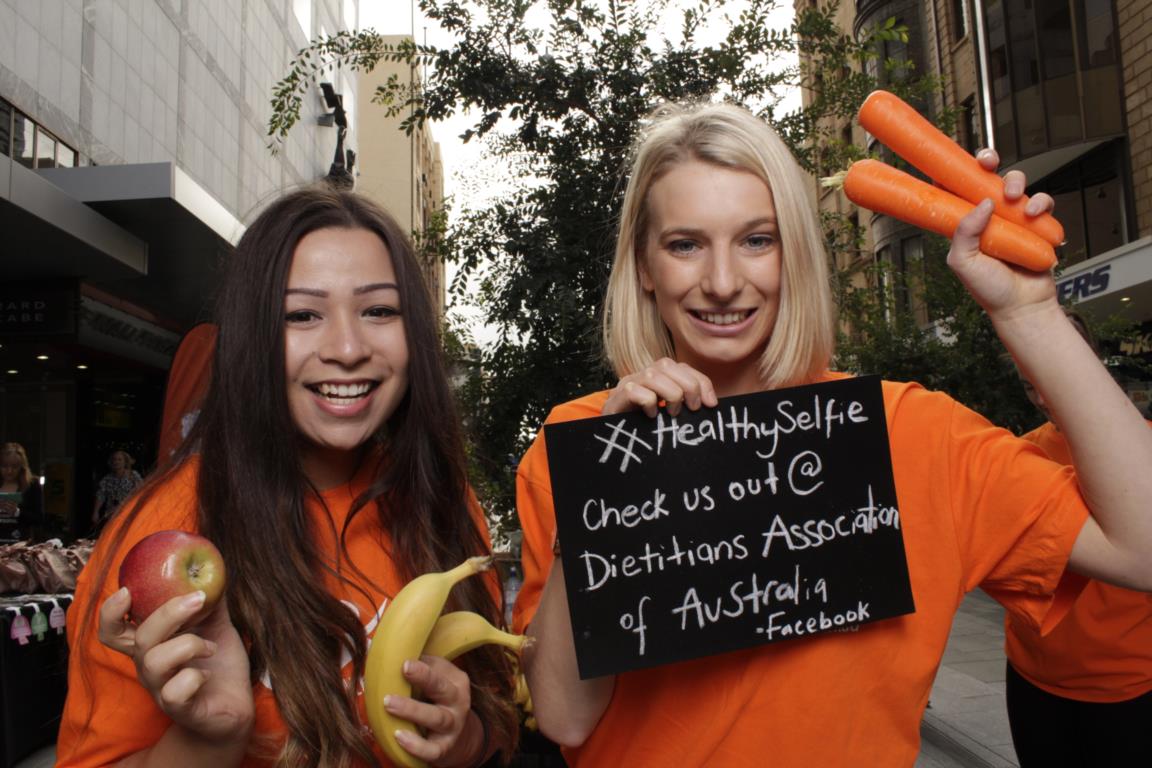 on 15 – 21 February. With over 750 events held around the country, involving over 1100 dietitians, we are excited to announce that AHWW 2016 was our largest campaign ever!
on 15 – 21 February. With over 750 events held around the country, involving over 1100 dietitians, we are excited to announce that AHWW 2016 was our largest campaign ever!
We had some great engagement on social media, with over 400 entries received into our Instagram competition and many dietitians sharing their #healthyselfie on Instagram or Twitter. We also had a Community Service Announcement airing on two television networks, as well as coverage in print and online media.
Throughout the campaign, we included our recently updated APD logo, which has changed from green to orange to provide fresh opportunities to promote APDs. Australia’s Healthy Weight Week also uses orange for promotional material, so the new logo was a great fit! The success of this campaign all helped to increase recognition of our APD logo and credential.
Launch event in Rundle Mall Adelaide – 15 March 2016
DAA partnered with
Sprout’s Themis Chryssidis APD and Callum Hann celebrity
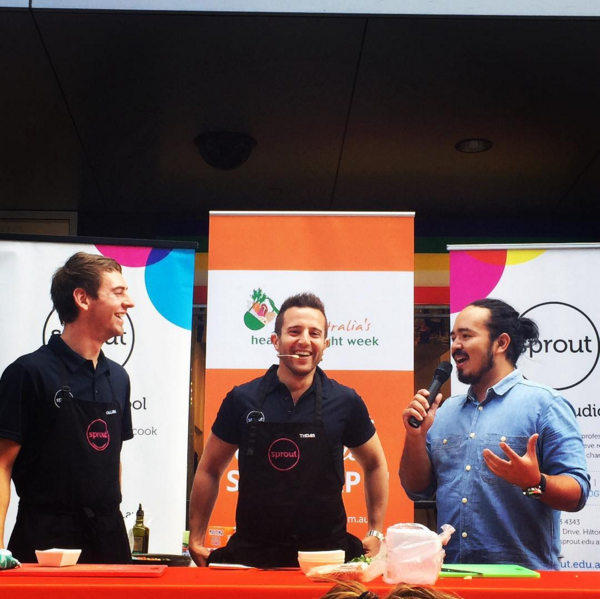
cook to host a live cooking event to launch AHWW 2016, helping to promote the home cooking message and to raise the profile of accredited practicing dietitians. This event included live cooking demonstrations, recipes, games and an opportunity to talk to dietitians.
Raising awareness of APDs was the aim of the day, and the sea of orange shirts worn by our volunteers was a great way to make our APDs stand out. People got to chat to APDs, test their nutrition knowledge and taste meals prepared from our downloadable
AHWW cookbook.
Our event was a success with a great turn out! Hundreds of people got to see in a practical way, how dietitian can improve the health of the public.
What else has DAA been up to?
On Friday 11 March 2016, APDs took the opportunity to get involved in our 3rd Dietitians Day. APDs hosted events around
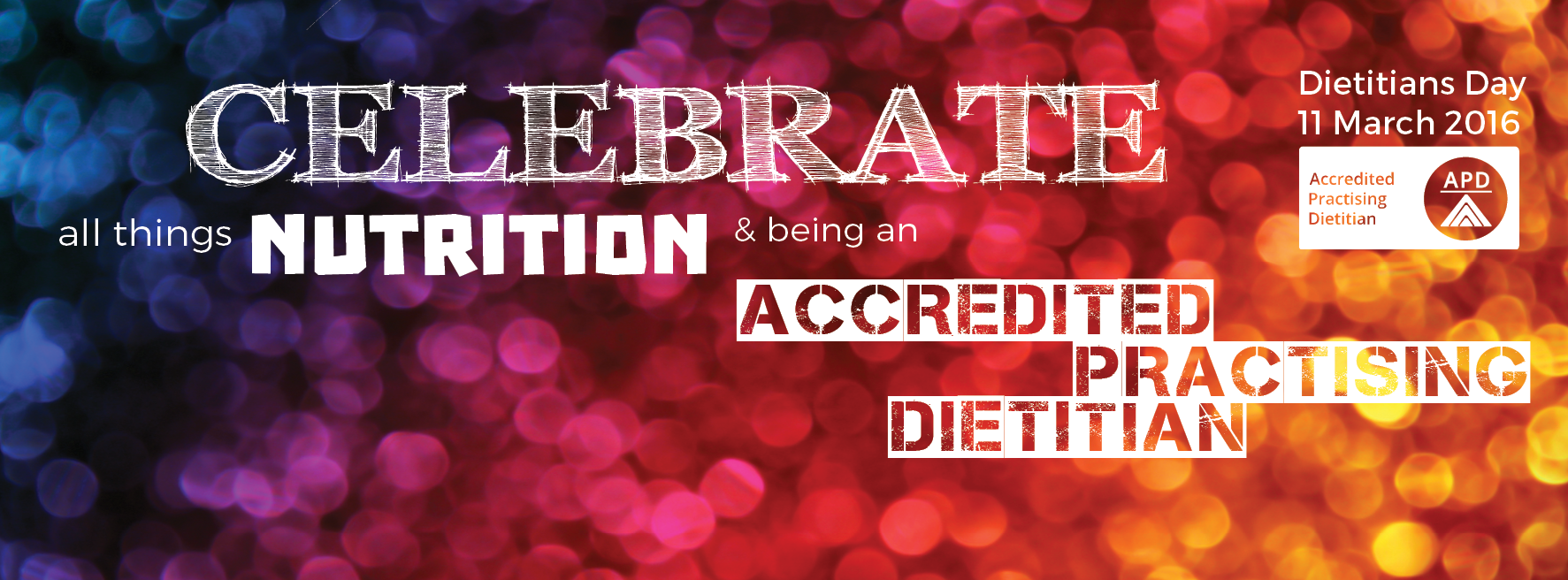
the country, to celebrate the important and varied work that we do with our colleagues. Some events included continuing professional development, while others were purely social.
Engaging with dietitians in my local area as well as dietitians around the country via social media on the day reminded me of the passion shared by members of our profession and that #dietitiansrock.
Natalie Latham APD
Communications Dietitian
Dietitians Association of Australia
communications@daa.asn.auFacebook:
Dietitians Association of AustraliaTwitter:
@DAA_feed Instagram:
@Dietitians_Association_Aus
PEN eNews is a bimonthly e-newsletter shared with the global PEN Community and created to help dietitians position themselves as leaders in evidence-based nutrition practice.
In addition, users of the PEN® system will find articles on the new evidence, resources and features available and how to maximize one's use of PEN.
thank you to our PEN® volunteers
Our global PEN® partnership has benefited from volunteer efforts around the world. Please take a moment to read and acknowledge your colleagues who have served as authors, or peer reviewers for PEN content since December 2015, as well as the International Working Groups.
Australia 
Kelly Lambert
Chris Irwin
Evelyn Volders
Derek Castles
Barbara Stet
Wolf Marx
Linda Campbell
Gabrielle O'Kane
Juliet Wiseman
Susan De Jersey
Natalie Stapleton
Stephanie Partridge
South Africa 
Annatjie Smith
If you would like to be a PEN® author or reviewers, please click here to send us your contact information.
Canada 
Sarah Hamden
Chwen Johnson
Misty Rossiter
New Zealand 
Tina Ambler
Kath Fouhy
Check out our new PEN® system look and see how we can help power-up your nutrition practice.
This April, we unveiled a new look to our PEN® Website! You will enjoy the same quality of evidence reviews, Trending Topics, client handouts and professional resources - but through a new and enhanced design!
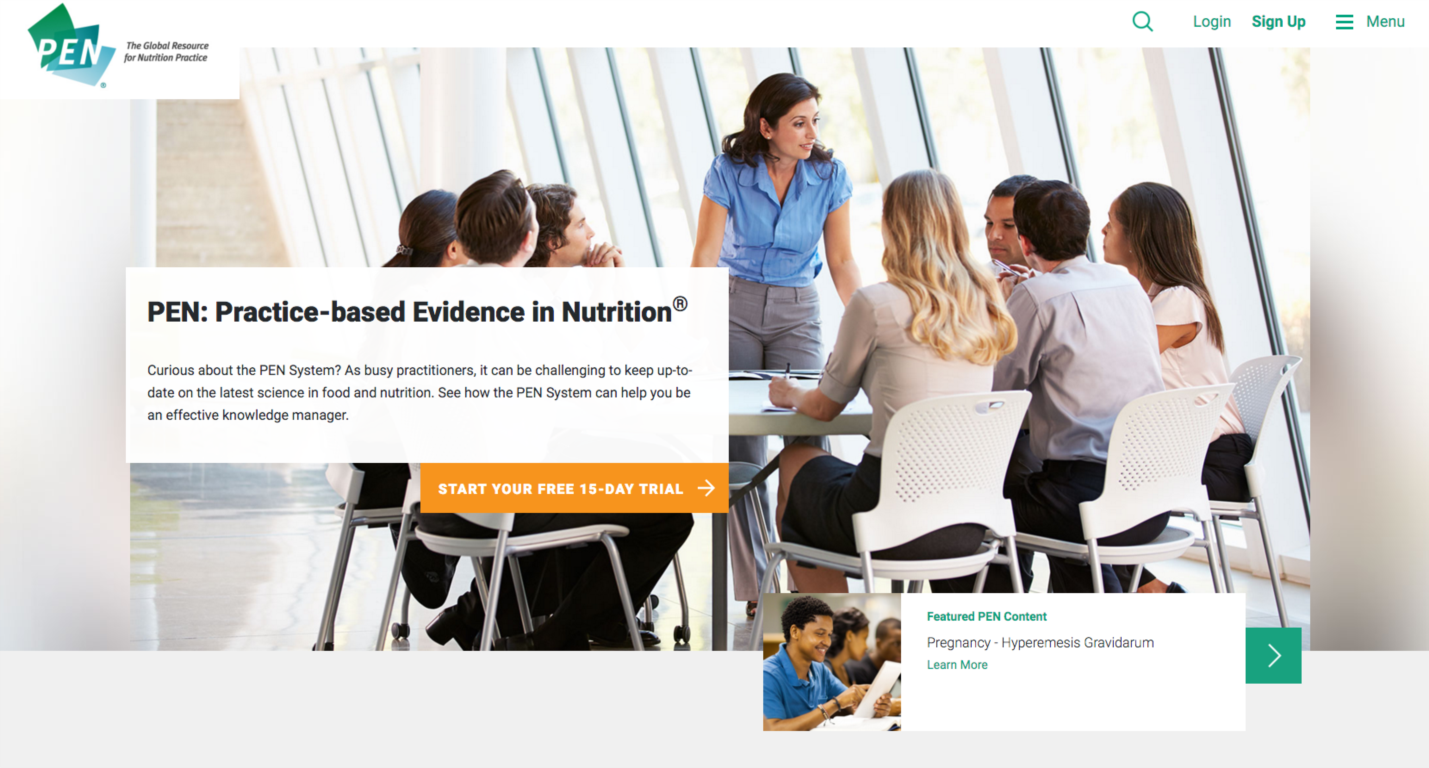
Why a new look? After 10 years of growth, we started to question whether the look of our website reflected the breadth and depth of our nutrition knowledge database. Whether it showcased how dietitians make a difference in the health of their clients. Whether it celebrated the community of dietitians around the world whom we help to bring together.
And then we knew – “It’s time to start something new and trust the magic of beginnings” (M. Eckhart). Over the last year, our PEN® team worked with our designers, our Information Technology specialists, our customer service team and our PEN® Advisory team to help build a website that was more user-friendly, helping dietitians access the evidence and resources they need in their daily practice.
The past few months, we completed a series of website testing to make the launch of our new website a seamless transition for you, our PEN® users.
Here are five new features we have in store for you:
Feature #1 – Our enhanced website design will make it easier to navigate our knowledge  database, and find the critical information you need for your dietetic practice.
database, and find the critical information you need for your dietetic practice.
Feature #2 – Our new PEN® website is “responsive” to you! This means that our website will “flex” to the size of the screen you are using, allowing you to easily use the PEN® database on your smartphone or tablet!
Feature #3 – Our modern website meets current design standards for an ever-evolving Internet. This means that our practice-powering content is laid out in a more engaging and interactive manner.
Feature #4 – We will have new PEN® Tours and Video Tutorials to help you navigate the PEN® website more efficiently.
Feature #5 – Over July and August, we will be translating the navigation of the PEN® system into French, Spanish and Japanese, to provide our PEN® users with a more customized experience. Stay tuned!
Feedback from our PEN system has been very positive! Thank you to our designers, our Information Technology specialists, our customer service team and our PEN® Advisory Team who worked with the PEN® Team to build a more user-friendly website, helping dietitians access the evidence and resources they need in their daily practice.
Come see how we can help power up your nutrition practice!
www.PENnutrition.com
Don’t have access to PEN? Try a 15-day free trial!
Written by:
Kristyn Hall MSc, RD
Editor, PEN eNews
Knowledge Transfer Events and Resources
Have a look at some of the web articles and peer-reviewed articles that caught our attention.
Web Articles:
Why people fall for pseudoscience (and how academics can fight back). Click here
Don’t be a conference troll: a guide to asking good questions . Click here.
How the media misrepresent risk – learn the difference between relative and absolute risk. Click here.
The world is flat! Bring on reiki, homeopathy and all that other bunk! Click here.
Using research evidence: A practical guide. Click here.
Cochrane reviews help with hospital policy development. Click here.
Video: Bench to bedside – What do dietitians do? Click here.
PEN does not have editorial or other control over the contents of the referenced Web sites. We are not responsible for the opinions expressed by the author(s) of the knowledge transfer events and do not endorse any product or service.
Contact Us
Do you have comments, questions or feedback? Please contact us:
Jayne Thirsk RD, PhD, FDC
Director of PEN®
Dietitians of Canada
jayne.thirsk@dietitians.ca
Sammie Gill BSc (Hons), PGDip, R.SEN, RD.
Policy Officer (Evidence-based Practice).
British Dietetic Association
globalpen@bda.uk.com
Natalie Latham APD
Communications Dietitian
Dietitians Association of Australia
communications@daa.asn.au
Kristyn Hall RD, MSc
Editor of PEN® eNews
Dietitians of Canada
eNews@pennutrition.com
PEN eNews
April 2016 Volume
5 (6)
A Publication of the PEN® System Global Partners,
a collaborative partnership between International Dietetic Associations.
Learn more about PEN.
Copyright Dietitians of Canada
. All Rights Reserved.